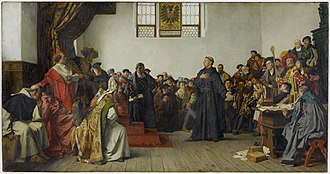Diet of Worms
The Diet of Worms was a council of the Holy Roman Empire in the city of Worms. The council was held because of Martin Luther and the Protestant Reformation. It lasted for five months in early 1521. The Emperor, Charles V led the council. Other councils (called Imperial Diets) were held in Worms in the years 829, 926, 1076, 1122, 1495, and 1545, but the most important Diet of Worms was in 1521.[1]

Background change
In June 1520, Pope Leo X wrote the Papal bull Exsurge Domine ("Arise, O Lord"), in which he talked about 41 problems he saw in Martin Luther's Ninety-five Theses and his other works. Because of this, the Holy Roman Emperor told Martin Luther to come to the diet. He promised that he would give Luther safe passage to and from it. The Diet started on 23 January 1521. Martin Luther was told that he had to either take back what he had said or defend it.
Events of the Diet change
Most of the important things in the Diet happened between 16-18 April. On 16 April, Martin Luther got to the city of Worms. He was told to come to the Diet at 4 p.m. on the 17th, and given a lawyer. After a day of arguing about his works, he was told that he was acting like a heretic. On the 18th of April, he went home. But Frederick III, Elector of Saxony thought that someone might kill him, so he faked a highway ambush and used this as a reason to hide Luther in one of his castles.
The Edict of Worms change
By 23 May 1521, Charles V, Holy Roman Emperor, Archduke of Austria, King of Spain (Castile and Aragon), King of Germany, King of Italy, Lord of the Netherlands, and Titular Duke of Burgundy had had enough of all of this Martin Luther business, so he wrote:
- For this reason we forbid anyone from this time forward to dare, either by words or by deeds, to receive, defend, sustain, or favour the said Martin Luther. On the contrary, we want him to be apprehended and punished as a notorious heretic, as he deserves, to be brought personally before us, or to be securely guarded until those who have captured him inform us, whereupon we will order the appropriate manner of proceeding against the said Luther. Those who will help in his capture will be rewarded generously for their good work.
- In Simple English: Because of this, we are not going to let anyone after this help Martin Luther or keep him safe or defend him or his ideas or agree with him. Instead, we want him to be arrested and punished as a very bad person who does not have the same religious beliefs as we do (he deserves this) and to be taken to us or to be guarded until the people who arrest him tell us and when they tell us we will have a trial against him. Anyone who arrests him will be given several good things for their good work.
After that, he ended the Diet of Worms.
However, because Luther was hidden in Wartburg Castle, nothing ever happened to him.[4]
References change
- ↑ Chronik der Stadt Worms Internet Archive
- ↑ Schaff, Philip (2015). History of the Christian Church. Arkrose Press. p. 145. ISBN 978-1346209654.
- ↑ Oberman, Heiko, Luther: Man Between God and the Devil, New Haven: Yale University Press, 2006, ISBN 0-300-10313-1.
- ↑ 1899 Lutheran Cyclopedia article titled "Nuremberg Convention"